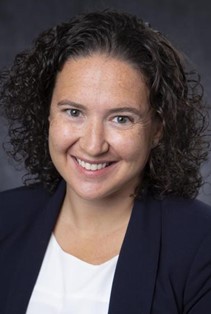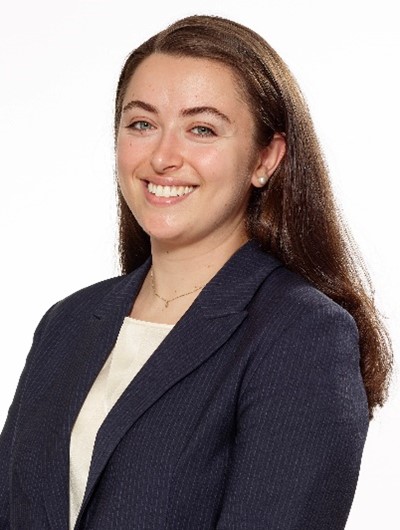
Dr. Meredith Baker MD, pediatric surgeon and attending physician at Maine Medical Center, grew up in the state of New Hampshire. She recounts following her veterinarian father around in childhood and that for as long as she can remember, she wanted to be a “doctor for human children.” However, it was not until medical school that she realized the type of doctor for children she wanted to be was a pediatric surgeon.
Dr. Baker’s path to her current role began with receiving her BA in Zoology from Miami University (Oxford, OH) in 2009, graduating Phi Beta Kappa. She went on to obtain her MD from the University of Cincinnati College of Medicine in 2013 and was elected to AOA. For general surgery residency, Dr. Baker trained in Boston at Beth Israel Deaconess Medical Center. During the course of residency, Dr. Baker spent two years working as a research fellow at Boston Children’s Hospital with Dr. Mark Puder. Following the completion of her general surgery residency, Dr. Baker went on to Pediatric Surgery Fellowship at New York-Presbyterian Morgan Stanley Children’s Hospital affiliated with Columbia University Irving Medical Center. She completed fellowship in 2022. She has received numerous awards including Outstanding Resident Teaching Award 2018 from Harvard Medical School and continues to take an active role in the education of medical students and surgical residents to this day. She currently holds a position as Assistant Professor of Surgery with Tufts University School of Medicine where she works with learners at Maine Medical Center both in clinical and academic settings daily.
Interview
What was the catalyst that got you interested in surgery originally? Did you always know you wanted to be a surgeon or did you figure it out during medical school?
I went to medical school knowing I wanted to be some sort of doctor for children but most certainly did not plan to be a surgeon. It was not until the middle of my third/clinical year when I was surprised by how bored I was on my pediatrics rotation and then switched to my surgery rotation that I realized I was going to be a surgeon. That said, once I did have this realization and looked back, the signs were always there – from my third-grade teacher telling me I was a kinesthetic-tactile learner to spending my entire youth playing team sports to my spending my weekends “helping” my veterinarian father in his OR.
Has your view on surgery changed throughout your training?
Interesting question. I don’t think my view on surgery has changed throughout my training (aging), but I think my view on medicine and career in general has changed. When I was 15, 20, 25 years old I did not realize that I could be completely happy with and even fulfilled by my personal life and felt that my career was going to be an essential part of my sense of self and purpose. However, now that I have a wonderful partner and young children and live in a beautiful part of the world that I love to spend time in, I realize that I could be happy without my career. That said, I wouldn’t change a thing. Even if I could be happy doing something else (or nothing at all), it is an interesting and rewarding challenge and a privilege to be able to take care of the children (and their families) in my community.
What led you to sub-specializing in pediatric surgery?
I always knew I would be caring for pediatric patients, the surgery part came later. Once I made the decision to be a surgeon, it was always my plan to be a pediatric surgeon, I really did not have a backup plan.
Did you encounter any obstacles in your surgical training? If so, how did you overcome them?
Everyone has obstacles, especially when training takes a decade. I overcame obstacles early on by putting my head down and gritting through them and also by the support and mentorship of the many role models and mentors I was fortunate to have early on. I think I handled the obstacles later in my training less well (or hid my struggles less well) but overcame them again with the support of my family, my close friends, and my mentors. It takes a village to get through this many years of training and I have been extremely fortunate to have a wonderful supportive village. Exercise and fresh air also help keep you sane.
What is your favorite part of your job? What is the most challenging?
Relieving suffering, fixing problems, and helping children get back to their lives are the obvious best parts. But I also really enjoy educating (and hopefully comforting) parents, helping colleagues, working as part of a team, and participating in educating residents and students. The challenging parts continue to be the sleep deprivation, missing time and events with my own family, and the parts of the job that are out of my control (paperwork, roadblocks, systems failures, etc.).
You spend a significant amount of time educating medical students and residents. What motivates you to provide this mentorship?
Two things. 1. It keeps things fresh and exciting. Pushes me to continue to learn (and re-learn) and also invigorates me as the enthusiasm of learners quickly pushes the frustrating parts of the job (see #5) to the back of my mind. 2. I feel very much that it is a duty, a part of my job. I had such wonderful teachers and mentors in medical school and residency and feel that I owe it to them to ‘pay it forward.’ Additionally, the students and residents that I am teaching will someday be my colleagues, my consultants, and perhaps even my family members’ doctors, so it always behooves me to educate and be kind to all.
What is a piece of advice you have for medical students who are interested in surgery, especially women?
First, decide if you really want to do it. Only you can decide this. And if you decide that you do, then jump in with both feet and don’t look back.
Do you find that there’s a leadership style for surgeons? How did you develop your style as a leader?
I am sure that everyone has a leadership style or styles for different situations but I certainly do not find there is one leadership style for all surgeons. A healthy department of surgery depends on having people of differing styles. During training, my leadership style was definitely to lead by example. Now that I am out of training, I am still figuring out my leadership style.
What accomplishment are you most proud of (does not necessarily have to be related to surgery/medicine)?
I used to say I was most proud of: (academic) getting my first first-author basic science paper published, and (non-academic) helping one of my favorite campers, who had CF and was certainly a large part in why I entered medical school thinking I was going to be a pediatric pulmonologist, learn how to do the butterfly stroke and thus pass into the highest level of swimming at the summer camp I used to work at. However, when I honestly think about this question today, I am most proud of being a mother to my beautiful, sweet, curious 3.5 year old son. I am sure my SAHD husband deserves the majority of the credit for the wonderful little boy that he has become, but for whatever small role I have played in his development, I am immensely proud.
Mentee Interviewer: Ariana Ginsberg, MS4

Ariana Ginsberg is a fourth-year medical student at Tufts University School of Medicine. Ariana grew up in New York and obtained her undergraduate degree in Neuroscience from Johns Hopkins University. Prior to beginning medical school, Ariana spent time conducting research at Hopkins and working in a colorectal surgical practice in New York. She is currently involved in research at Tufts and serves as New England Regional Representative for the AWS Medical Student Committee. Ariana is an aspiring pediatric surgeon and believes in the power of mentorship and community support for fellow women surgeons and medical students. Outside of medicine, Ariana loves running, classical ballet, and finding the best bagels in every city.

